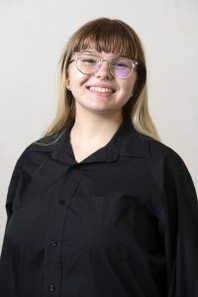Saturday, Dec. 30, 2023 | 2 a.m.
View more of the Sun's opinion section
Editor’s note: About 550 Clark County high school students participated in the annual Sun Youth Forum on Sept. 11 at Clark High School. The students were divided into groups to discuss several topics. A spokesperson was chosen from each discussion group to write a column about the students’ findings. Marie Kirkikis-Marshall, a senior at Del Sol Academy of the Performing Arts, tells of the students’ opinions in the session entitled “Law and Crime.”
Who is the law designed to protect? What are the goals of the criminal justice system? Are the goals to punish offenders, rehabilitate them, protect society by labeling and separating them, or something else altogether?

Student Representative Marie Kirkikis-Marshall, Del Sol Academy of Performing Arts, poses during the Las Vegas Sun Youth Forum at Clark High School Monday, Sept. 11, 2023.
These questions were at the forefront of the discussion at the 65th Sun Youth Forum, where I was among a handful of students from across the valley who gathered to discuss some of the most pressing issues facing Nevada and the country as a whole. Our topics ranged from criminal cases involving child abuse to police reform and the statute of limitations. But two issues dominated the conversation: laws related to abortion and transgender rights.
We began our discussion of abortion laws by examining different types of reproductive rights and restrictions, and asking who these laws were designed to protect. Some laws were clearly designed to protect women, while others were designed to protect unborn babies, and still others were designed to protect health care providers or spouses of pregnant women.
There were significant disagreements about when and how abortion rights should be restricted, with some students arguing that it should only be allowed in cases where the mother’s life is at significant risk. However, all of the participants in the conversation agreed that all women should have at least some limited right to seek an abortion under certain circumstances.
In other words, abortions should not be completely banned.
We also agreed that abortion should not be criminalized and that medical providers and women should have the right to privacy when seeking the medical procedure. There was also consensus that banning abortions is unlikely to prevent them from occurring, but is more likely to make abortion procedures less safe.
Finally, we agreed that there is a general lack of education and knowledge about safe sex practices and pregnancy prevention in schools and society. This lack of knowledge can contribute to the spread of STDs and unwanted pregnancies, thus contributing to the need for abortions. Having knowledge about different ways to prevent unwanted pregnancies and use contraceptives properly is essential.
After the discussion of abortion, we discussed the rights of transgender, nonbinary and intersex people.
There was broad consensus that transgender, nonbinary and intersex people are deserving of full human rights, including the right to live authentically, receive supportive care and be treated as equals under the law.
Despite being high school students, a group that is often highlighted as most in need of protection from predators, no one in the group expressed a belief that transgender people are inherently predatory. Rather, we agreed that transgender students should be allowed to use the bathroom that aligns with their gender identity or have access to gender-neutral bathrooms.
Similarly, we also discussed that instead of having separate boys’ and girls’ sports, society could embrace co-ed sports. One participant even discussed their own experience as a transgender person and how participating in sports should be equal to all, no matter their identity. Most importantly, we all agreed that being trans shouldn’t be criminalized or subject someone to discrimination under the law.
The discussion brought so many opinions, stories and issues to light. It showed me that students have strong opinions and powerful voices. By discussing challenging topics together, with courage and mutual respect, we learned about one another and about ourselves. Hopefully, we can take these lessons into the future and present our beliefs to local, state and federal government officials, creating positive change for the law and society in the future.
